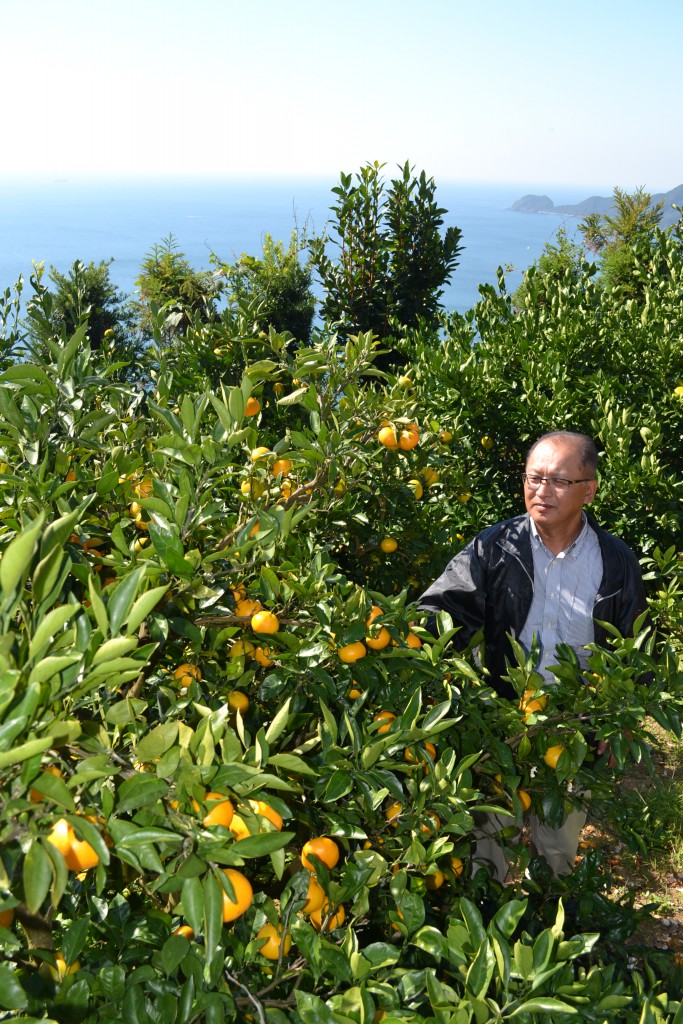
Hiroki Abe takes care of mikan trees at his orchard located on steep slopes in Ikata, Ehime Prefecture
Hiroko Obara
Domestic mikan (Japanese tangerine) farmers are totally shocked at the announcement by the government to abolish tariffs on oranges and orange juice in line with the broad agreement reached under the Trans-Pacific Partnership free-trade talks. The news came as a complete surprise, as no reports had been made on the TPP negotiations over farm products other than five key sensitive items. Although domestic growers have been trying hard to produce high-quality products to cope with market liberalization, they say it will become difficult to compete with imported fruits just by differences in quality.
The town of Ikata, Ehime Prefecture, is a major mikan growing region with numerous orchards located on mountain slopes looking out over the sea. Hiroki Abe, a 52-year-old farmer who grows Unshu Mandarin oranges on 4 hectares of land in the town, says he is worried because he believes farmers’ efforts alone will not be enough to tackle tariff elimination.
In order to prevent imported fruits from competing with domestic ones, seasonal tariffs are imposed on imported oranges. The tariff rate is set at 16 percent between June and November, and raised to 32 percent between December and May during the peak marketing season of Unshu Mandarin oranges and Chubankan varieties – citrus fruits other than Unshu Mandarin oranges that are grown in Japan. Under the TPP agreement, the 16 percent tariff will be eliminated in the sixth year after the agreement takes effect, and the 32 percent tariff will be abolished in the eighth year. Tariffs on orange juice and processed products such as jam and jelly will be incrementally reduced to zero.
“Even farmers who produce the best quality mikans have to ship 10 or 20 percent of their products for processing as their quality is not as high. If the TPP agreement is put into practice, there will be even less demand for such products, and the prices of fruits will go down,” says Muneaki Utsunomiya, head of the farming advisory division of JA Nishiuwa, a farm co-op in Yawatahama, Ehime. However, it would not be easy for farmers to consider exporting the products, considering currency fluctuations and quarantine systems.
In 1991, Japan decided to liberalize its orange market by abolishing import quotas for fresh oranges and orange juice. After tariffs were reduced in 1995 based on the agreement made in the Uruguay Round of talks under the General Agreement on Tariffs and Trade, many citrus fruit farmers nationwide gave up their business. Under such circumstances, JA Nishiuwa and farmers struggled together to survive by growing high-quality products. They managed to create a strong brand by taking such measures as strictly classifying the products according to the level of sugar content and promoting sales in metropolitan areas.
Abe has worked with producers in the area to solve the problem of alternate bearing in Onshu mikan trees and develop fruits with well-balanced sourness and sweetness. “We strived together to build a high-quality mikan growing region. The central government should acknowledge the producers’ efforts,” he stressed.
Producers of Chubankan citrus fruits are also deeply concerned over the future of the industry. Takeharu Nomoto, 72, who grows 10 types of Chubankan fruits in Matsuyama, Ehime, worries that many of the varieties could be forced out of the market. “I fear that the government’s support measures will be concentrated on five key items and little assistance will be given to fruit growers,” Nomoto said.
Chubankan citrus fruits tend to compete directly with imported oranges and are facing constant risk of a large drop in price ranges. Producers have been conducting replanting to shift to more competitive varieties, and they are not convinced with the government’s decision that makes all their efforts go to waste.
Shozo Murata, 60, who grows Unshu Mandarin oranges and Chubankan citrus fruits on 5.5 hectares of land in Yawatahama, says he is hesitating to ask his 29-year-old son, now working at a bank, to succeed his business. “Looking at what is agreed in the TPP talks, I cannot tell my son to come back and engage in mikan growing,” Murata says.
Some claim that domestically-grown mikans can coexist with imported oranges because they differ in quality, but Kenji Okamoto, chairman of Japan Fruit Growers Cooperative Association, says such views are too optimistic. “(Those who think so) don’t know anything about the situation of farmers,” says Okamoto, also chairman of JA Zen-Noh Ehime, an agricultural co-operative association engaging in sales and marketing of Ehime-grown farm products.
He says citrus fruit farmers will not feel confident about continuing their business under the conditions set by the TPP agreement, nor will they be convinced with subsidies given out temporarily. Citrus fruit growing regions cannot be maintained unless they are given long-term assistance, he said.
(Oct. 27, 2015)

